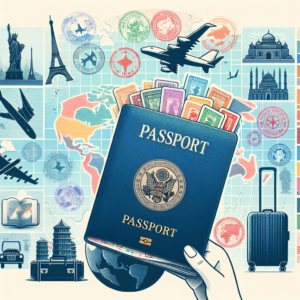Global Travel in Turmoil: Unraveling the Shocking New Restrictions
[caption id="attachment_37184" align="alignnone" width="624"] Visa Travel[/caption]
In recent months, global travel has faced unprecedented challenges as countries around the world implement a new wave of restrictions aimed at curbing the spread of infectious diseases and addressing security concerns. These measures have left travelers and the tourism industry grappling with uncertainty, as the landscape of international mobility continues to shift dramatically. This article delves into the multifaceted implications of these restrictions, exploring their impact on global mobility, the driving factors behind their implementation, and the broader economic and public health considerations at play.
Understanding the Impact of New Travel Restrictions on Global Mobility
The recent surge in travel restrictions has significantly altered the dynamics of global mobility, affecting millions of travelers and reshaping the way people approach international journeys. With countries reinstating entry requirements such as mandatory quarantines, testing protocols, and vaccination proof, the ease of travel that many had come to expect has been severely compromised. This has led to a decline in international travel demand, with many individuals reconsidering their plans or opting for domestic alternatives. The ripple effects of these restrictions extend beyond individual travelers, impacting families, businesses, and the interconnected global economy that relies heavily on the free movement of people.
Key Factors Driving the Implementation of Stricter Travel Regulations
Several key factors have contributed to the tightening of travel regulations worldwide. The ongoing threat of new variants of infectious diseases, particularly in the wake of the COVID-19 pandemic, has prompted governments to adopt a more cautious approach to international travel. Additionally, geopolitical tensions and security concerns have led some nations to impose stricter border controls to safeguard their citizens. The interplay of these factors has resulted in a complex web of regulations that vary significantly from one country to another, creating confusion and frustration among travelers who must navigate this evolving landscape.
Analyzing the Economic Consequences of Travel Turmoil on the Tourism Industry
The tourism industry, a vital component of the global economy, has been disproportionately affected by the recent travel turmoil. With international travel restrictions in place, airlines, hotels, and tour operators are facing unprecedented financial challenges. Many businesses have reported significant revenue losses, leading to layoffs and closures. The World Travel and Tourism Council (WTTC) has warned that the prolonged uncertainty surrounding travel could result in a loss of millions of jobs and billions in economic output. As countries grapple with the dual challenges of public health and economic recovery, the tourism sector remains in a precarious position, reliant on the gradual easing of restrictions to revive its fortunes.
Public Health Concerns: The Rationale Behind Recent Travel Limitations
Public health considerations are at the forefront of the rationale behind the recent travel limitations. Governments are prioritizing the health and safety of their populations, implementing measures designed to prevent the importation of new cases and protect healthcare systems from being overwhelmed. The emergence of new variants has heightened these concerns, prompting authorities to act swiftly to mitigate risks. While these restrictions may be seen as burdensome by travelers, they are often justified as necessary steps to safeguard public health and prevent further outbreaks. The challenge lies in balancing these health imperatives with the economic realities faced by the tourism industry.
Navigating the Complex Landscape of International Travel Compliance
As travel restrictions evolve, navigating the complex landscape of international travel compliance has become increasingly challenging for travelers. Each country has its own set of entry requirements, which may include proof of vaccination, negative COVID-19 tests, or quarantine upon arrival. This patchwork of regulations can lead to confusion and misinformation, making it essential for travelers to stay informed and prepared. Many governments and airlines are now providing resources to help travelers understand the latest requirements, but the onus remains on individuals to ensure they comply with all necessary protocols before embarking on their journeys.
Future Outlook: What Travelers Can Expect Amid Ongoing Restrictions
Looking ahead, the future of global travel remains uncertain as countries continue to grapple with the implications of ongoing restrictions. While some nations are beginning to ease their entry requirements in response to improving public health conditions, others remain cautious, opting to maintain stringent measures. Travelers can expect a gradual return to normalcy, but the timeline for this recovery will vary significantly by region. Innovations in travel technology, such as digital health passports and streamlined testing processes, may help facilitate a smoother travel experience in the future. However, the potential for sudden changes in regulations means that flexibility and preparedness will remain essential for travelers in the months to come.
In conclusion, the recent wave of travel restrictions has created a tumultuous environment for global mobility, with far-reaching implications for individuals and the tourism industry alike. As governments navigate the delicate balance between public health and economic recovery, travelers must remain vigilant and adaptable in the face of ongoing uncertainty. While the path to a fully restored travel landscape may be fraught with challenges, the resilience of the industry and the commitment of travelers to explore the world will ultimately shape the future of international travel.
